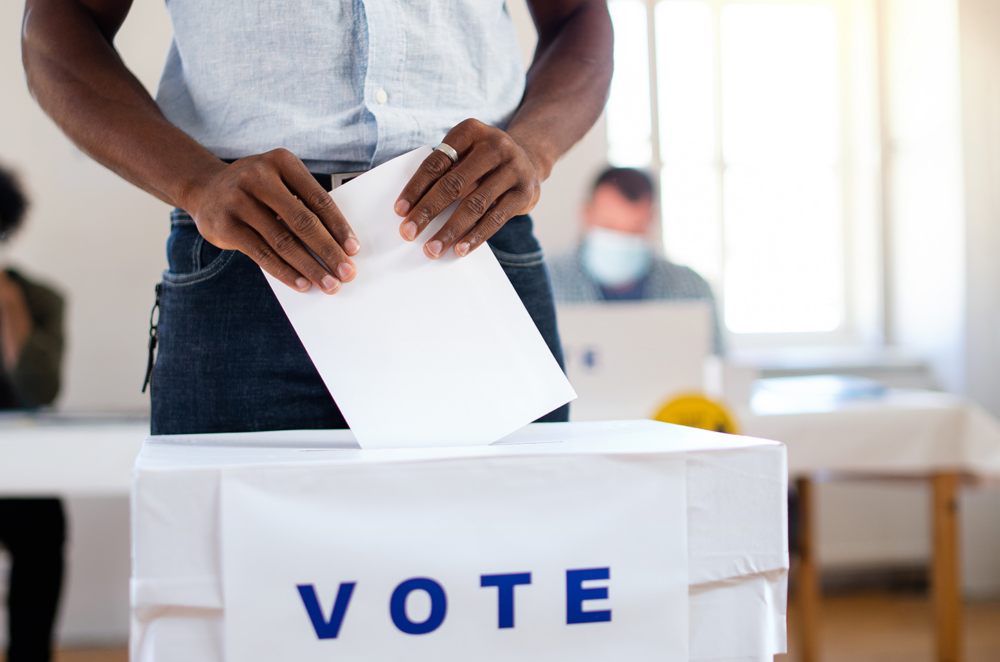NC Ruling Just the First Step in Legal Battle to Protect Voters of Color

WASHINGTON – Voting rights advocates today announced plans to appeal an April 25, 2016 ruling from the U.S. District Court for the Middle District of North Carolina which upheld H.B. 589, North Carolina’s monster voter suppression law. The court ruled the measure does not violate the Voting Rights Act or the Fourteenth, Fifteenth or Twenty-Sixth Amendments to the U.S. Constitution. The current injunction on the law’s proscriptions of same day registration and out of precinct voting – which has been in place since 2015 – will remain in effect until June. In August of 2013, Advancement Project, along with co-counsel from Kirkland & Ellis, LLP and attorneys Irving Joyner and Adam Stein, challenged H.B. 589 on behalf of the North Carolina State Conference of the NAACP.
“The continuation of H.B. 589’s restrictive provisions is an affront to democracy, and we are appealing the decision,” said the Rev. Dr. William J. Barber II, president of the North Carolina State Conference of the NAACP and architect of the Forward Together Moral Movement. “Passing H.B. 589 right after the Supreme Court gutted the Voting Rights Act in June of 2013, as the North Carolina General Assembly did back in August 2013, indicates this law was intentionally discriminatory. Prior to Shelby, North Carolina had to submit proposed voting legislation for preclearance. After Shelby, the legislature acted with warp-speed to pass the monster voter suppression law. Through widespread actions, rallies, marches and protests, we continue to assert that we will accept no less than unabridged access to the ballot for all eligible voters. We appealing this dangerous precedent on behalf of tens of thousands of NC NAACP members and plaintiffs.”
“In abridging voting rights for African Americans and Latinos, H.B. 589 turns back the clock to our nation’s terrible Jim Crow past,” said Advancement Project Co-Director Penda D. Hair. “In a democracy, voting should be free, fair and accessible for all eligible voters. H.B. 589 tactically targets the provisions that once made North Carolina among the states with the highest turnout in the nation. This progress was especially clear among African-American and Latino voters, who came to rely on measures like early voting, same-day registration and out of precinct provisional ballots to ensure their voices were heard. By specifically targeting the very measures that were most used by people of color – in addition to imposing a restrictive photo ID requirement – the legislature sought to disturb the levers of power in North Carolina.”
“The court’s decision admits historic discrimination, but ignores how that discrimination impacts voting rights today,” said Attorney Michael Glick of Kirkland & Ellis, LLP. “The court may be attempting to justify their decision upholding the voter suppression law by pointing to high turnout in 2014, when the voter ID provision of the law was not in effect. However, to uphold the voter suppression law based on turnout in 2014 is short-sighted and ignores the burdens already borne by African American and Latino voters. We intend to seek relief for the provisions of the law that we believe continue to disproportionately burden the rights of African Americans and Latinos to participate in the political process.”
“We cannot embrace a belief that if someone goes through herculean measures to miraculously overcome mammoth discrimination, then the discriminatory obstacles are okay. This is a faulty and dangerous rationalization,” said the Rev. Dr. William J. Barber, President of the North Carolina State Conference of the NAACP. “We were able to overcome discrimination during the period of segregated schools, but separate and unequal was never morally acceptable. Just because a political party cannot win if everyone votes doesn’t mean they should resort to trickery and engage in voter suppression.”
“By specifically eliminating the very measures responsible for opening access to voting for voters of color is the essence of retrogression,” Rev. Dr. Barber said. “If the protections of Section 5 were in place, this legislation would very likely have been found to be retrogressive. That speaks to why Congress must act to reinstate the protections of the Voting Rights Act and why North Carolina is at the epicenter of determining whether the U.S. is moving forward or backward.”
“For us this fight is not over,” said Attorney Irving Joyner. “This is the first step in a legal battle that will continue in the courts to ensure the Voting Rights Act continues to protect voters of color from discriminatory measures like H.B. 589.”
# # #
Advancement Project is a multi-racial civil rights organization. Founded by a team of veteran civil rights lawyers in 1999, Advancement Project was created to develop and inspire community-based solutions based on the same high quality legal analysis and public education campaigns that produced the landmark civil rights victories of earlier eras.